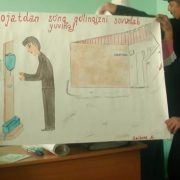Team member of the external review team, responsible in particular for the assessment of issues regarding project sustainability and potential for scaling-up.
Country:
Uzbekistan
Project Period:
2007
Name of Client(s):
Description of the Project:
The Rural Water Supply and Sanitation Project (RWSSP) is part of the SDC/seco Water Strategy in Central Asia and responds to a critical need to improve the health and living conditions of rural populations with potable water and better hygiene practices in the Andijan and Ferghana provinces in the Republic of Uzbekistan. It builds on the experience gained in Community Water Management in the Ferghana Valley project 2001 – 2003. It is in line with the Government’s priority to improve rural inhabitants’ access to potable water. The project is being implemented by the International Secretariat for Water (ISW) in close cooperation with the authorities (Hokimiats) of the Andijan and Ferghana regions (oblasts). The overall goal of the project is to improve the living and health conditions of rural communities in the Andijan and Ferghana regions of Uzbekistan by providing safe potable water and improving hygiene practice. The project includes infrastructure development, capacity building of village water committees, and hygiene education involving women and young people.
This external review, which entailed discussions with all stakeholders involved – representatives of Khokimiats of the Ferghana and Andijan Regions, water (and water related) management bodies and water users (population), as well as other donors in the sector –, had the following objectives:
- evaluate the results, relevance, efficiency and effectiveness of the project based on the project objectives specified in the Project Document
- assess the major needs and obstacles for improving the operational reliability, quantity and quality of water supply systems in rural areas and the legal/operational environment for the local management of the water systems
- assess the relevance of the hygiene and social mobilization programs implemented along with the investment activities.
- draw conclusions and provide recommendations for the continuation of the project, including its possible extension to Tajikistan (regional project)
The methodology applied was participatory as far as possible. This is fairly well reflected by the implementation sequences of the review mission
- Discussion and exchange meetings at the National level (Uzbekistan Communal Services Agency, World Bank, Asian Development Bank), Oblast level (Hokimiat (Ferghana/Andijan) Vodocanal (Ferghana/Andijan) Health/Justice departments, Ferghana Valley) and Rayon level (Hokimiat (Ohunbabaev, Rishton, Pahtabad, Mahamat, Ulugnor
- Field visits in six project villages of phase 1 (2004 – mid-2007) and one of the previous phase, including meetings with village/mahallah committees, water committees, other key stakeholders, water users, youth parliaments and hygiene promotion actors
- Working sessions with project staff / management and the SDC water sector backstopper




